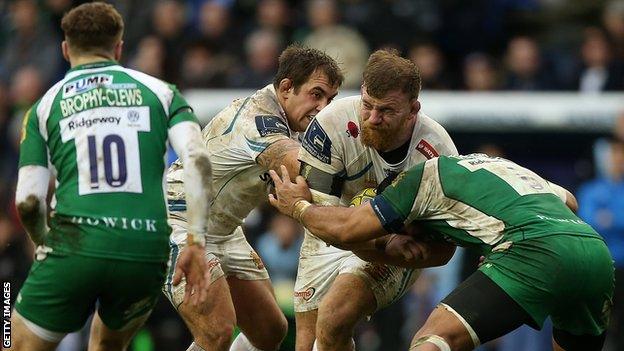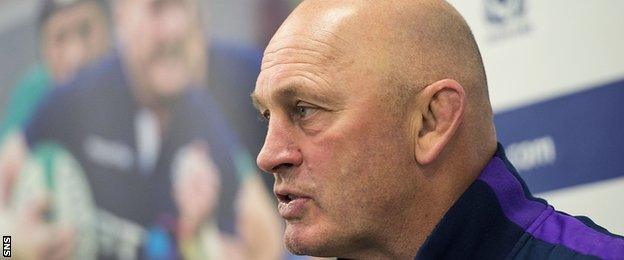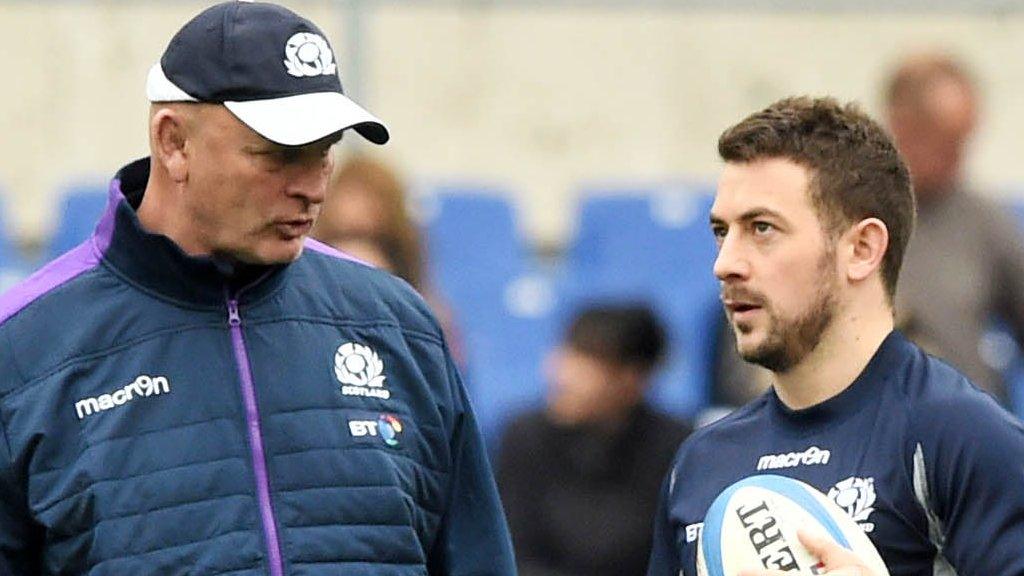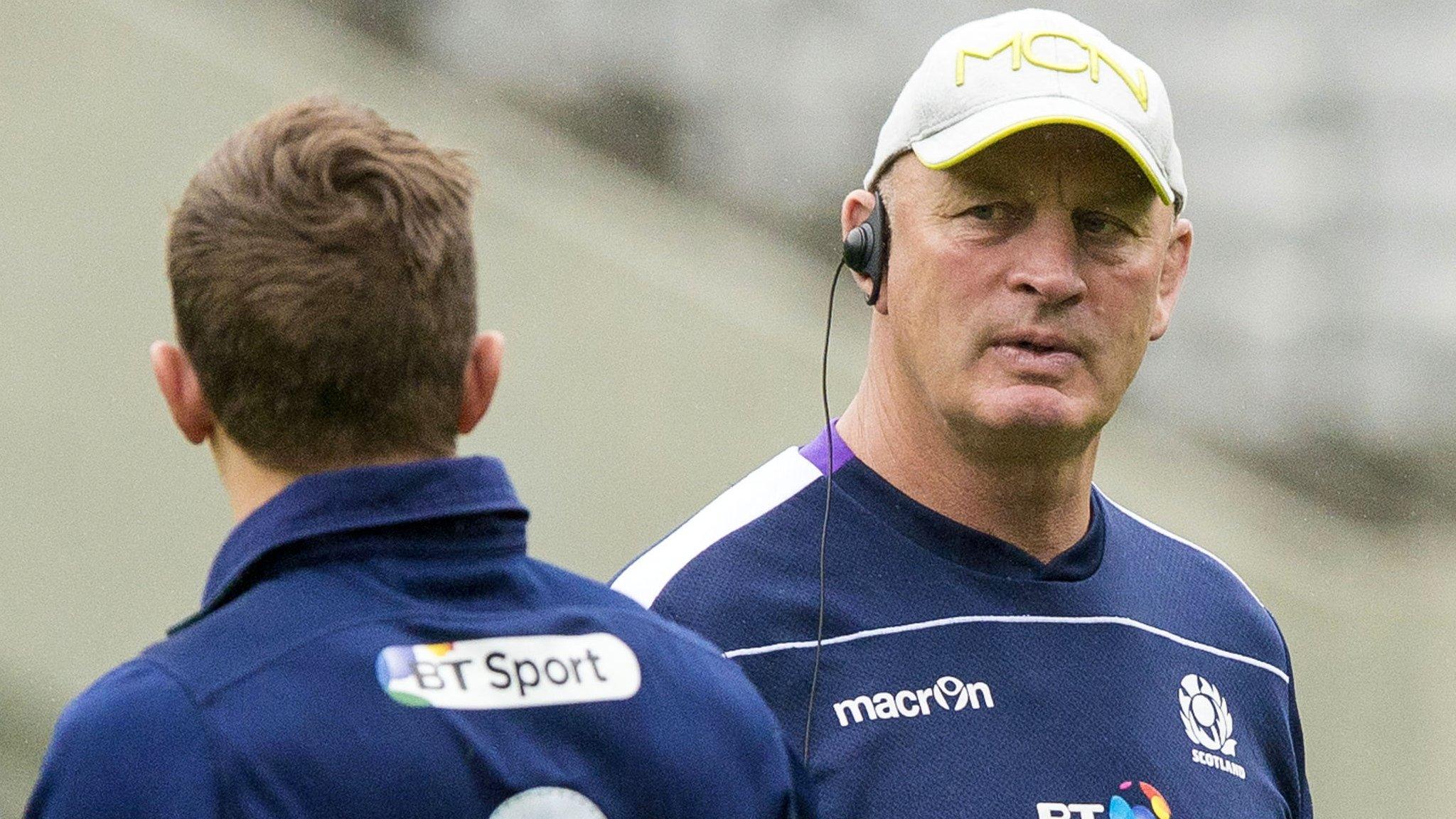Q&A: Why English clubs may not release Scots for autumn Tests
- Published

Exeter's Moray Low (second from right) is one of the Scots who may get caught up in the dispute
English Premiership clubs have voted to withhold players from Scotland duty ahead of this year's autumn Test series against Australia, Argentina and Georgia.
BBC Sport Scotland explains the dispute.
Why the disagreement?
Premiership Rugby Ltd have taken the stance over alleged outstanding injury bills.
Which players are potentially affected?
Scotland captain and scrum-half Greig Laidlaw, of Gloucester, Saracens backs Sean Maitland and Duncan Taylor, Exeter prop Moray Low and Harlequins wing Tim Visser have all been selected by Scotland head coach Vern Cotter for November's matches.
Scotland's autumn Tests |
|---|
Scotland v Australia, 12 November, BT Murrayfield |
Scotland v Argentina, 19 November, BT Murrayfield |
Scotland v Georgia, 26 November, Rugby Park |
What have Scottish Rugby said?
"We are in positive talks with PRL and expect our players to be available."
What have World Rugby said?
"It would be inappropriate to comment on specific cases, but World Rugby is committed to facilitating the application of Regulation 9 where required to ensure that the world's top players are able to represent their national team during defined windows."
What does Cotter make of it?
"The fact of the matter is you can't deny people the opportunity to play Test match footie," said Cotter. "I don't think you can.

Cotter insists the players should be released for Scotland duty
"It may be frustrating at times that you have players leaving or injured or coming back injured. International rugby's important fixtures and it's pretty tough to try and deprive a player of the possibility to play for his country."
What are Premiership Rugby Ltd saying?
"World Rugby Regulations make the Union responsible for losses and expenses incurred as a result of injury sustained when a player is on International Duty. However a number of players (not all) have returned injured to our clubs from Test duty in recent seasons, and the clubs have been left to the pay the bills that are the responsibility of those Unions.
"In all cases Premiership Rugby clubs have paid the medical bills and the salary of their players who have been injured on Test duty, to ensure those players did not suffer any hardship.
"Some of those bills were incurred more than 12 months ago and we have repeatedly asked those unions to settle the bills.

Saracens team-mates Taylor and Maitland have 41 Scotland caps between them
"Our only option - to protect our players - is to withdraw them from Test matches until adequate provision to cover them on Test duty is guaranteed.
"We have the support of the RFU and The Players Union, The Rugby Players Association (RPA) in pursuing these claims.
"We understand that many of the Tier Two nations suffer financial hardship which is why we believe the solution to this problem lies with World Rugby.
"We believe a Fund could be set up from the Rugby World Cup surplus to help Unions settle these insurance claims, which can run into hundreds and thousands of pounds.
"Clearly our clubs can't continue to pay these bills."
Are any other unions involved?
PRL have taken the same stance with the Italian, Samoan and Tongan unions.
BBC Sport's Chris Jones
"I can't really remember this happening in the past. My hunch is that Scotland are in decent negotiating terms and this probably should get sorted out. Whether it will for Samoa, Tonga or Italy is perhaps another issue.
"This is not a false threat from the Premiership clubs, they do mean business and so I think it's in everyone's interests to get it sorted.

Visser and Laidlaw were part of Scotland's 2015 World Cup squad
"Just look back to the European Cup crisis that saw the end of the Heineken Cup and the birth of the Champions Cup. That was entirely led and driven by the English Premiership clubs in conjunction with the French.
"It was that unified determination from all the Premiership clubs - the chairmen, the chief executives all voting together - that really did force the issue when it came to disbanding the old European set-up.
"When that [international] window is open, regulation 9 is in force, which in effect means that the players have to be released. Because this is quite an unprecedented case, we're not too sure whether World Rugby would intervene or can intervene.
"Premiership Rugby are calling on World Rugby to intervene so certainly World Rugby's involvement in this is going to be very crucial."
- Published25 October 2016

- Published24 October 2016

- Published25 October 2016

- Published25 March 2018